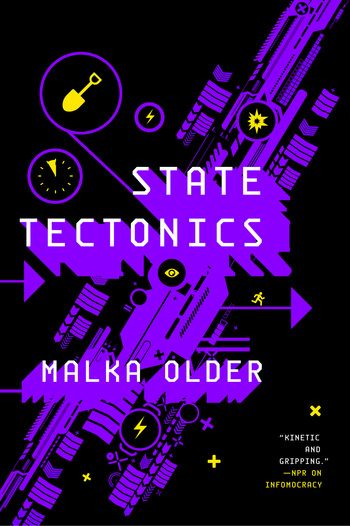State Tectonics marks the first time I’ve finished an entire new trilogy since I finished The Obelisk Gate back in 2017? 2018? (And we’ll overlook, as well, A Desolation Called Peace, which is so bound up with A Memory Called Empire that I’m pretty sure the two novels started as one gigantic tome.) Genre fiction as of late has the bad habit of turning everything into series of some kind or another, and when my reading life is already navigating the tension between the scope of my ambitions and the limits of my time, series are the last thing I need. But I was so taken with Malka Older’s cyberpunk-y political thriller and the complex electoral near-future she had imagined that I went ahead and finished the next two books, though at this point if she comes out with further installations I will declare myself done. Not because I doubt they’ll be good, but because I only have so much time on this earth.
Like she did with Null States, Older jumps ahead to a few years after the previous book left off. It’s election time again, the same as in Infomocracy, and this time the sprawling tech giant Information itself is under attack. Rogue physical assaults are being launched against Information servers and hubs around the world; unsanctioned communications channels designed to go undetected by Information have been figuratively as well as literally unearthed; mysterious individuals are roaming around cities and handing out self-destructing paper copies of “local guides” that claim to be better sources of information than Information itself. Who is responsible? What’s their end game? Is it an inside job? How will all this affect the upcoming election? Again, like in Null States, Older expands perspectives to include secondary characters we haven’t spent much time with before—Maryam, a Muslim lesbian techie who first appeared on the side in Infomocracy; Amran, a young and inexperienced Sudanese Information employee introduced in Null States—while touching base with previous perspective characters like now-married, now-pregnant Roz from Null States and Mishima from Infomocracy.
I would recommend reading all three books in pretty close succession, if only to keep the rather large cast of characters straight in your head, particularly the side and secondary ones. My timing didn’t quite work out, so while I read Infomocracy and Null States back-to-back, I took six weeks off in the middle of State Tectonics to go on vacation (and I wasn’t about to bring a hardback library book with me in my carry-on luggage). Whatever nuance I failed to grasp because I forgot who was a member of which political party who had broken up with whom wasn’t enough to make the broader strokes of the action impenetrable to me, and quite frankly I just plain have fun spending time in the world to which Older has obviously given an incredible amount.
Without getting into serious spoiler territory, I will say this: State Tectonics is an incredibly satisfying ending that is on brand with how the geopolitics in the series have developed and shifted across all three books. People who are better at intrigue than I am might be able to guess where the story is going, but for me the ending was well-earned. Older sticks the landing, no doubt about it.

